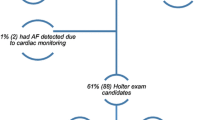Abstract
Atrial fibrillation (AF) is intermittent in 30% of patients with cardioembolic stroke and, therefore, might not be seen in a single standard ECG recording. The aim of this study was to evaluate if prolonged ECG monitoring (96 h) finds episodes of intermittent AF beyond the 24 h ECG monitoring in patients with cryptogenic stroke or transient ischemic attack (TIA). We prospectively evaluated consecutive patients affected by cryptogenic stroke or TIA who had sinus rhythm on a 12-lead ECG on admission, and during ECG monitoring performed in the acute phase (for at least 24 h). Patients had continuous 96 h Holter ECG monitoring within 30 days from stroke onset. 114 patients were included in the study (mean age 63.1 ± 15.1, 59 males). AF was found in 29 patients (24.3%). In 20 patients, AF was found in the first 24 h of recording, and in nine patients after 24 h. In addition, several other dysrhythmias such as supraventricular ectopic activity (33), ventricular tachycardia (10), sinus pause (4) and sinus-atrial block (1) were found. In patients with cryptogenic stroke or TIA, 96 h ECG monitoring detected a high rate of AF. One-third of AF was seen beyond 24 h of ECG monitoring.
Similar content being viewed by others
References
Vingerhoets F, Bogousslavsky J, Regli F, Van Melle G (1993) Atrial fibrillation after acute stroke. Stroke 24:26–30
Flaker GC, Belew K, Beckman K, Vidaillet H, Kron J, Safford R, Mickel M, AFFIRM Investigators (2005) Asymptomatic atrial fibrillation: demographic features and prognostic information from the Atrial Fibrillation Follow-up Investigation of Rhythm Management (AFFIRM) study. Am Heart J 149(4):657–663
Guercini F, Acciarresi M, Agnelli G, Paciaroni M (2008) Cryptogenic stroke: time to determine aetiology. J Thromb Haemost 6:549–554
Marini C, De Santis F, Sacco S, Russo T, Olivieri L, Totaro R, Carolei A (2005) Contribution of atrial fibrillation to incidence and outcome of ischemic stroke: results from a population-based study. Stroke 36(6):1115–1119
Glotzer TV, Daoud EG, Wyse DG, Singer DE, Ezekowitz MD, Hilker C, Miller C, Qi D, Ziegler PD (2009) The relationship between daily atrial tachyarrhythmia burden from implantable device diagnostics and stroke risk: the TRENDS study. Circ Arrhythm Electrophysiol. 2:474–480
Binici Z, Intzilakis T, Nielsen OW, Kober L, Sajadieh A (2010) Excessive supraventricular ectopic activity and increased risk of atrial fibrillation and stroke. Circulation 121:1904–1911
Liao J, Khalid Z, Scallan C, Morillo C, O’Donnell M (2007) Noninvasive cardiac monitoring for detecting paroxysmal atrial fibrillation or flutter after acute ischemic stroke: a systematic review. Stroke 38:2935–2940
Jabaudon D, Sztajzel J, Sievert K, Landis T, Sztajzel R (2004) Usefulness of ambulatory 7-day ECG monitoring for the detection of atrial fibrillation and flutter after acute stroke and transient ischemic attack. Stroke 35:1647–1651
Bansil S, Karim H (2004) Detection of atrial fibrillation in patients with acute stroke. J Stroke Cerebrovasc Dis. 13:12–15
Tayal AH, Tian M, Kelly KM, Jones SC, Wright DG, Singh D, Jarouse J, Brillman J, Murali S, Gupta R (2008) Atrial fibrillation detected by mobile cardiac outpatient telemetry in cryptogenic TIA or stroke. Neurology 71:1696–1701
Elijovich L, Josephson SA, Fung GL, Smith WS (2009) Intermittent atrial fibrillation may account for a large proportion of otherwise cryptogenic stroke: a study of 30-day cardiac event monitors. J Stroke Cerebrovasc Dis. 18:185–189
Capucci A, Santini M, Padeletti L, Gulizia M, Botto G, Boriani G, Ricci R, Favale S, Zolezzi F, Di Belardino N, Molon G, Drago F, Villani GQ, Mazzini E, Vimercati M, Italian AT500 Registry Investigators (2005) Monitored atrial fibrillation duration predicts arterial embolic events in patients suffering from bradycardia and atrial fibrillation implanted with antitachycardia pacemakers. J Am Coll Cardiol 46:1913–1920
Botto GL, Padeletti L, Santini M, Capucci A, Gulizia M, Zolezzi F, Favale S, Molon G, Ricci R, Biffi M, Russo G, Vimercati M, Corbucci G, Boriani G (2009) Presence and duration of atrial fibrillation detected by continuous monitoring: crucial implications for the risk of thromboembolic events. J Cardiovasc Electrophysiol 20:241–248
Bhatt A, Majid A, Razak A, Kassab M, Hussain S, Safdar A (2011) Predictors of occult paroxysmal atrial fibrillation in cryptogenic strokes detected by long-term noninvasive cardiac monitoring. Stroke Res Treat 2011:172074
Conflict of interest
None.
Author information
Authors and Affiliations
Corresponding author
Rights and permissions
About this article
Cite this article
Manina, G., Agnelli, G., Becattini, C. et al. 96 hours ECG monitoring for patients with ischemic cryptogenic stroke or transient ischaemic attack. Intern Emerg Med 9, 65–67 (2014). https://doi.org/10.1007/s11739-012-0755-3
Received:
Accepted:
Published:
Issue Date:
DOI: https://doi.org/10.1007/s11739-012-0755-3




